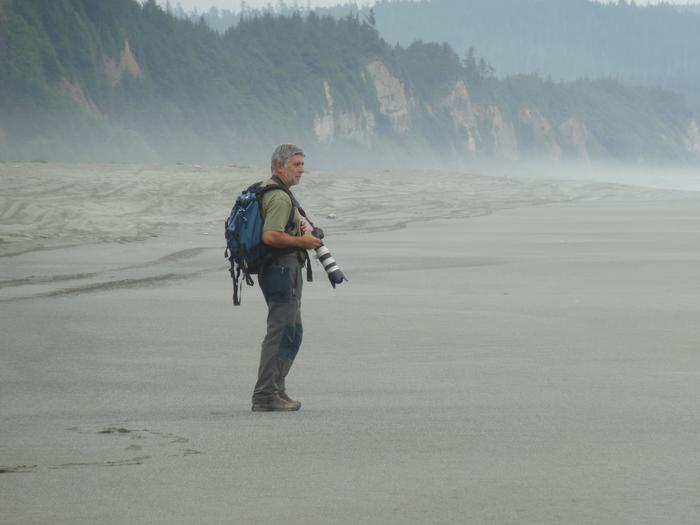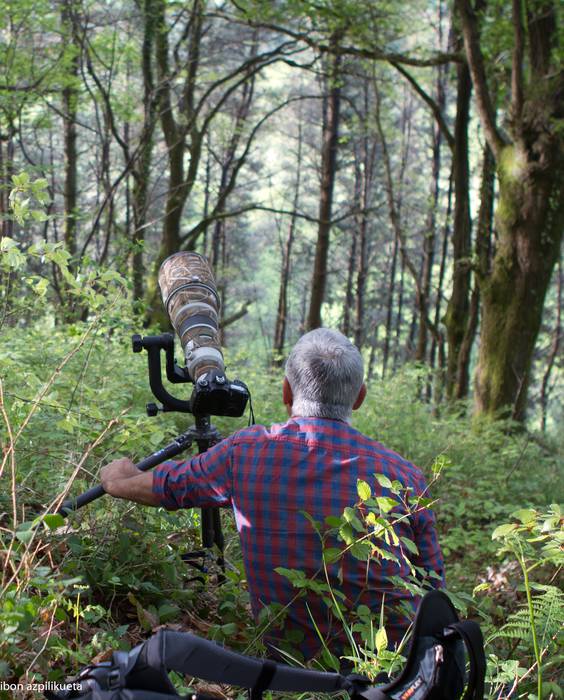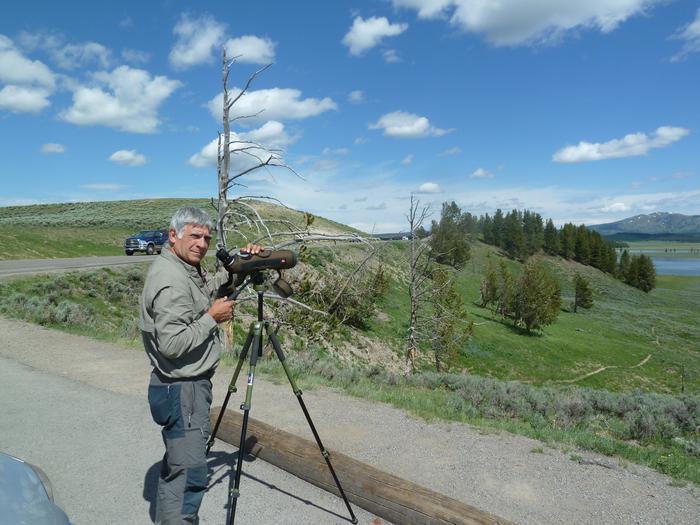He replaced the shotgun with a camera of photos and since then the objective of its exits and travels is to closely monitor the life of the animals. Despite seeing many animals, he has confessed that he enjoys so much on the first day with respect to them. A Senegalese saying goes that birds are the fastest animals in the world, as they take the best of the north and the south. Joxe Martin Otaegi has also learned a lot from birds and comes to the interview with what he has learned.
As a young man, you've been a hunter.
We were family hunters by tradition, dad, uncles and four siblings. As a young man, our pastime was hunting, we did not know how to go to the mountain without a dog or shotgun.
How did you think of putting the shotgun aside?
It was the patience I had in my head, we started watching on television the documentaries of Félix Rodríguez de la Fuente and, seeing what I was doing, I realized that what I was doing didn't make sense. I threw the piece, took it home, ate almost always, but sometimes I would rot and ask myself: What did you do? I didn't want to go on like that, it was hard for me to take the step, but I gave it.
Remember when you made the decision?
We went to the campsite to Urbasa, at that time you could hunt in Urbasa. We went out in the morning to look for the piece, and all of a sudden, I had two stares in front of it and pointed at me, and I pulled the shotgun back and it was my last exit as a hunter. I have never regretted the resolution I took.
When is that?
That was 40 years ago.
He changed the shotgun pum by the clisk of the camera…
I spend a lot better on taking pictures, because I have the telescope, the binoculars and a good camera. They're necessary to see the birds, it's a delight to me.
In order to be a fan of birds, patience is also needed.
Horrible. It's one thing to go see the birds and another to see. We've spent days waiting for the bird and we've come home without seeing the bird. I once saw in Aralar a white chauffeur while I was in the car and turned to see where I was going. The next day, at dawn, I went to the site that I had seen, I hid in the forest, and at noon it appeared in the same branch that I had put the day before. I took some pictures of him and came back to life gladly.
The main purpose of your travels or exits is to see birds or animals?
Always in recent times, in summer, he walks around Europe, seeing birds in France, Slovenia, Lithuania and Poland. I traveled with a group of professional amateurs from the Canary Islands and learned a lot. I saw 15 birds I didn't know! In the autumn I spent 15 days in Finland watching birds living alone in northern Europe.
What species can we see in the forests and in the sky around us?
In Gipuzkoa there are birds that are disappearing, but we also have the presence of new species. On the one hand, they've multiplied because people don't hunt. The herd, for example, has returned to our streams, before it was hunted, now no, like ducks and curly rolls, walks alone by streams. The black peak, previously seen only in Navarre, did not even appear in Gipuzkoa. Now we can see it in our forests in Tolosaldea. It looks like a crow, but with a red head. This bird, with its beak, pierces the wood in a drawer. There's no trace of cold wind in our mountains, they came when it snowed, we don't see a single one. Extremadura and Palencia are plagued by aircraft. A good place to see the birds in our environment is Txingudi Bay.
With the birds of the cities there are also quite a lot of jokes. Coexistence is hard and between the pigeons of the city...
I saw in the church of Santa Maria a hawk of lies hanging from a reed, ready to smell the pigeons. The first day he will drive them away, but he will soon realize that the falcon is standing. Pigeons are not stupid. Pigeons choke, but who pulls the most, they or us? This is the question I ask.
Is people's awareness of birds changing?
On the one hand, yes, or I'd like to think about it.
On the other side of the link are hunters.
Hunters have a lot of strength, they're a lot of strength, and I've seen more young hunters than I thought in recent demonstrations.
Although hunting moves money, the conservation of animals is not left behind, in Africa safaris is made to see the animals free. Conservation can be a source of income, right?
No doubt. At the moment, the presence of wild animals in Zamora and Asturias brings tourism, to which many people come from England and France. In many places they have realised that the money involved in this tourism is easier than the money obtained from livestock farming. Bars and accommodation are filled in the small towns. It's finally a rope.
What moments do you like as observer animals?
I still enjoy as much as the first day watching birds and animals. I remember many, seeing the bird feeding in its nest is beautiful or seeing wolves and bears.
I remember recently, waiting to see the bears on an abrupt mountain in Asturias, two bears came out on a runway. At the top of the runway, the farmer walked with 10-12 cows and the bears saw the shepherd and sneaked. The pastor didn't even see the bears. We were able to see this show from the other hill. It's an image I'll never forget.
Or seeing four or five wolves chased by the deer, it's stuck forever in the memory.
What is the current situation of wolves?
They're hunted in some places, in others they're protected. It is a species that is also wanted to be protected in the Basque Country. We have to realize that the presence of different species of animals on the mountain is a great enrichment. In the first place, there was an end to the death of cats, cats, lynx… and when they are about to disappear, a lot of money is spent on reintegration projects. We have to do the accounts before. There are animals that have a negative stigma as if they were bad. But having animal varieties in the mountains is nothing but wealth. We have to take care of the wolves, the bears, the lynx -- they're part of our world. If we kill them all, what will we do? We have to learn to love and respect animals.
But farmers won't say that...
An Asturian pastor once told us that the bear has to be respected because it is an animal of great value. These pastors live there, on the mountain, these pastors are the guardians of the entire ecosystem. Before, grazing was like this, all day there on the mountain in respect of its surroundings. Now we leave the cattle on the mountain and march. But in our mountains there are many other animals.
Noah also introduced all animal species into his boat.
He was also afraid of something!
You have confessed that as a young person you enjoyed watching documentaries and, from seeing them, you have become the protagonist of documentaries.
I had the invitation to participate in the documentary Dreaming of wings, which was invited by my professional chorizo friends from the Canary Islands. I was a carpenter of office and I had the bird's hobby. The five friends that we have the same hobby recorded how we enjoyed watching the birds. I think the documentary will reach Tolosa around February or March.
What do your fellow hunters say?
They give me a reputation as crazy, but I tell them that for a moment you're looking at animals. The free animal will come back. With what dies, it's over.




